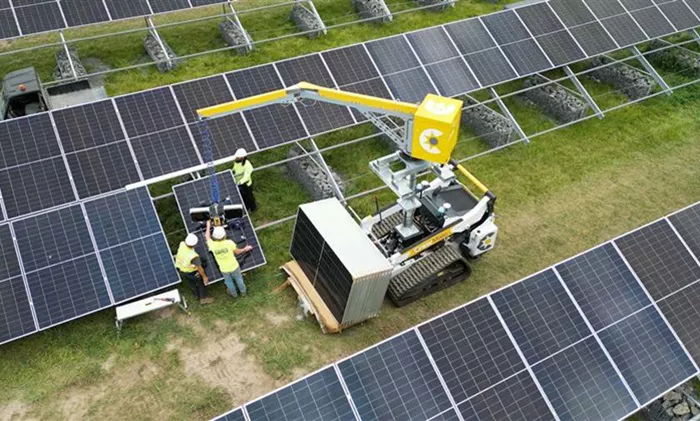Moog Construction’s innovative semi-autonomous lift-assist vehicle, CrewMate, has successfully completed a field trial in challenging terrain near Niagara Falls, showcasing its potential to assist solar field workers in installing photovoltaic (PV) panels. The trial, organized by Montante Solar, took place on a solar field situated atop a closed landfill, providing an ideal backdrop for testing the vehicle’s capabilities.
The rugged and undulating landscape served as a proving ground for CrewMate’s advanced leveling system and maneuverability. During the trial, the vehicle was tasked with transporting pallets loaded with up to 31 large PV panels, each weighing approximately 83 pounds. CrewMate efficiently followed workers, utilizing its lift-assist feature to help lift and position the panels onto the solar module racking.
Equipped with sensors, CrewMate maintained a safe distance from both workers and obstacles while assisting in the installation process. This capability not only enhanced safety but also streamlined operations, allowing crews to focus on their tasks without the added physical strain.
The Bureau of Labor Statistics anticipates a 22% growth in demand for solar PV installers by 2032, outpacing the average growth rate for all occupations. In light of this demand, Montante Solar’s vice president, Steven Erck, emphasized the importance of CrewMate in improving productivity and ensuring the safety of workers. “CrewMate is an innovation we believe can safely increase productivity and help meet the demand for new solar farms and workers,” he stated. “The PV panels in this field test are among the largest and heaviest installed by crews; CrewMate took the strain out of installation work that’s often done in high temperatures and remote areas.”
Beyond enhancing efficiency, the semi-autonomous lift-assist vehicle aims to reduce panel breakage and prevent common injuries associated with manual handling of heavy equipment. Dave Grabau, business director for Autonomy and Robotics at Moog Construction, remarked on the vehicle’s integration with operational concepts: “CrewMate also keeps humans in the loop versus a fully robotic solution. A robot, with higher levels of autonomy, requires greater precision, especially when you have ground instability and racking to contend with; cobots like CrewMate reduce complexity.”
Looking ahead, CrewMate is set to participate in a larger pilot project aimed at constructing a solar field at a new location later this year, further underscoring its promise in the evolving landscape of solar energy installation.
Related topics:
- Eaton Cummins Joint Venture Announces New Leadership Team
- Mack Boring & Parts Partners with WhisperPower to Distribute Advanced Generators
- RWE and TotalEnergies Unite to Develop 4 GW of Offshore Wind Power in Germany

